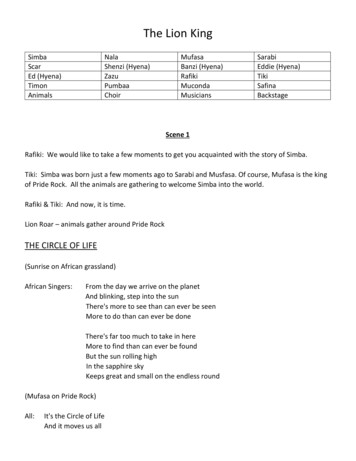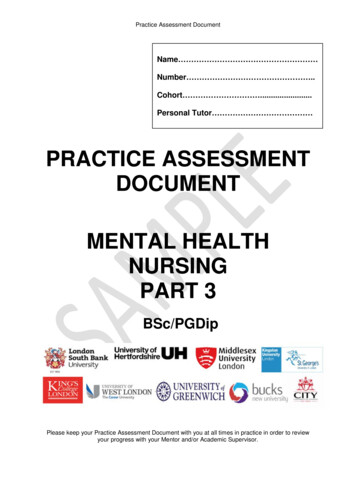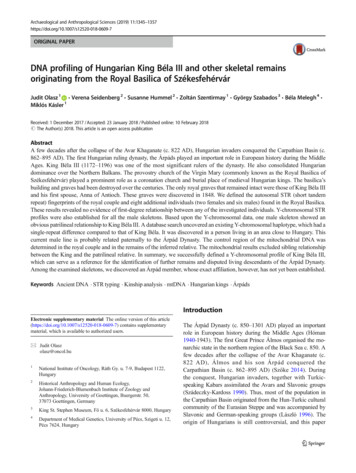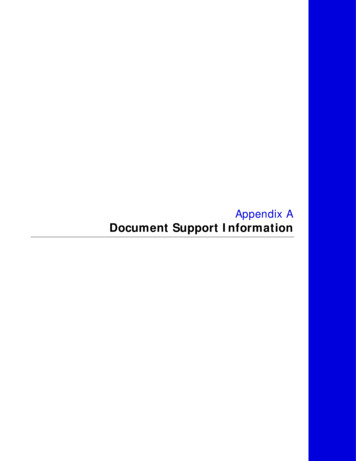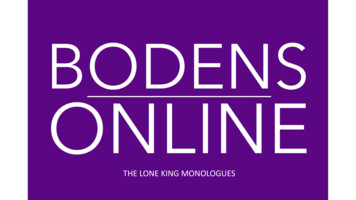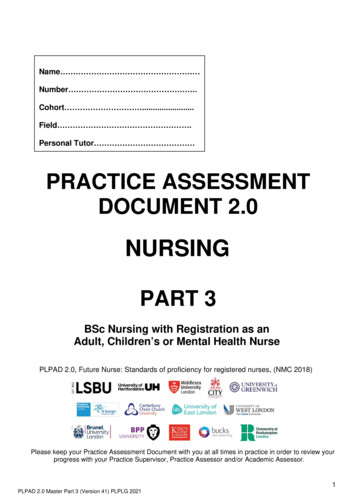
Transcription
Name Number .Cohort .Field .Personal Tutor PRACTICE ASSESSMENTDOCUMENT 2.0NURSINGPART 3BSc Nursing with Registration as anAdult, Children’s or Mental Health NursePLPAD 2.0, Future Nurse: Standards of proficiency for registered nurses, (NMC 2018)Please keep your Practice Assessment Document with you at all times in practice in order to review yourprogress with your Practice Supervisor, Practice Assessor and/or Academic Assessor.1PLPAD 2.0 Master Part 3 (Version 41) PLPLG 2021
This Practice Assessment Document has been developed by the Pan LondonPractice Learning Group in collaboration with practice partners, mentors, academicstaff, students and service users across the London Region. This work has been ledby Jane Fish as Project Manager.Membership of the Pan London Practice Learning Group (PLPLG) Kathy Wilson, Associate Professor, Head of Practice Based Learning, Middlesex University(Chair)Nicki Fowler, Programme Leader/Professional Lead, Learning Disabilities, University ofGreenwich (Vice Chair)Lynn Quinlivan, Practice Programme Co-Ordinator for Pre-Registration Nursing, University ofHertfordshireSue Woodward, Senior Lecturer, King’s College LondonJulie Bliss, Head of Practice Learning, King’s College LondonKaren Chandler, Associate Professor, Director of Practice Learning, Kingston University andSt George's, University of LondonAlex Levine, Faculty Director Practice Learning, Canterbury Christ Church UniversityJulie MacLaren, Deputy Divisional Lead – Practice Education, City, University of LondonMichelle Ellis, Senior Lecturer, Child Health, City, University of LondonYvonne Halpin, Associate Professor (Practice Learning), London South Bank UniversityNigel Davies, Head of Pre-Registration Nursing, University of East LondonBarbara Hoyle, Head of Practice Education University of West LondonJo Rixon, Principal Lecturer for Practice Learning, Buckinghamshire New UniversityRachel Bacon, Associate Teacher Practice Learning, The University of Nottingham (MEPLGrepresentative)David Marston, Senior Strategic Programmes, Planning and Performance Manager, QualityPatient Safety and Commissioning Team (London), Health Education EnglandJane Fish, PLPAD Project ManagerIan Grant-Rowan, (PLPAD Document Design) Systems Support/Projects, MiddlesexUniversityClara Longley, Gregory Brinsdon, Project Administrator, Middlesex UniversityThe development of this document was funded by Health Education England (London) PLPLG 2018 All rights reserved. No part of this work may be photocopied, recorded orotherwise reproduced without the prior permission of the Pan London Practice LearningGroup.2PLPAD 2.0 Master Part 3 (Version 41) PLPLG 2021
Contents PageWelcome to the Practice Assessment Document (PAD)4Guidance for Using the PAD6University Specific Guidelines7Criteria for Assessment in Practice8List of Practice Supervisors9List of Practice Assessors10Placement 111Placement 231Placement 351Progression Towards Registration – Record of Weekly Meetings71Assessment of Proficiencies73Part 3 Episode of Care 183Part 3 Episode of Care 286Part 3 Medicines Management89Action Plan92Record of Practice Hours94Statement regarding the use of the term “Parts”There are three Practice Assessment Documents in total, which incorporate therange of Future Nurse Standards of proficiency (NMC 2018). “Parts” in this context isused to represent the range of outcomes to be achieved by students at differentlevels. These parts may differ from the parts of the education programme that will bedefined locally by each university provider.3PLPAD 2.0 Master Part 3 (Version 41) PLPLG 2021
Welcome to the Practice Assessment Document (PAD)Student responsibilitiesThis Practice Assessment Document is designed to support and guide you towards successfullyachieving the criteria set out in the Future nurse: Standards of proficiency for registered nurses andStandards for education and training (NMC 2018).The PAD makes up a significant part of your overall programme assessment. It will need to beprocessed through formal University systems. Continuous assessment is an integral aspect ofassessment in practice and you are expected to show evidence of consistent achievement. Youshould engage positively in all learning opportunities, take responsibility for your own learning andknow how to access support. You will work with and receive written feedback from a range of staffincluding Practice Supervisors and Practice Assessors and you are required to reflect on yourlearning.You are responsible for raising concerns with a nominated person in the practice setting in a timelymanner. You should also alert staff to any reasonable adjustments that may be required to supportyour learning.You should ensure you are familiar with your university assessment and submission processes forthis document and contact the academic representative from your university, or refer to youruniversity’s intranet if you require support or advice on specific university procedures.The Ongoing Achievement Record (OAR) is a separate document that summarises yourachievements in each placement and with the main document provides a comprehensive record ofyour professional development and performance in practice.You are responsible for the safekeeping and maintenance of the PAD. It should be available to yourPractice Supervisor, Practice Assessor and Academic Assessor at all times when you are inplacement together with the OAR. Alterations should be made in this document by crossing throughwith one line, with a signature and date.You will have access to confidential information when in practice placements. The PAD should notcontain any patient/service user/carer identifiable information. Contents must not be disclosed to anyunauthorised person or removed, photocopied or used outside the placement or university.People must be offered the opportunity to give and if required withdraw their informed consent tostudent participation in their care and staff in practice will provide guidance as required. Beforeapproaching any patient/service user/carer for feedback you must discuss with your PracticeSupervisor/Practice Assessor who will facilitate consent.Practice Supervisor responsibilities (Registered nurse/midwife or other registered health/socialcare professional)In many practice areas the student will be supported by a number of Practice Supervisors. Someareas may adopt a team based approach due to the nature of the experience.As a Practice Supervisor you have an important role in supporting and guiding the student throughtheir learning experience to ensure safe and effective learning. This includes facilitating learningopportunities including any reasonable adjustments the student may need to get maximum benefitfrom the placement. It is your responsibility to contribute to the student’s assessment through therecording of regular feedback on their progress towards, and achievement of their proficiencies.Specific feedback must be provided to the Practice Assessor on the student’s progress.4PLPAD 2.0 Master Part 3 (Version 41) PLPLG 2021
Supervision in other placement areas (i.e. those areas where there are no health/social careregistrants)A range of staff can support student learning and have a vital role in student learning anddevelopment though may not be contributing formally to assessment of proficiencies.However, these staff members are encouraged to support learning and can provide valuablestudent feedback within the PAD on the Record of communication/additional feedback pages.Practice Assessor responsibilities (Registered Nurse)As a Practice Assessor you have a key role in assessing and confirming the student’s proficiencyproviding assurance of student achievements and competence. This includes facilitating learningopportunities including any reasonable adjustments the student may need to get maximum benefitfrom the placement. You will observe the student, conduct and record student assessments informedby student reflections, feedback from Practice Supervisors and other relevant people to confirmachievement. You will liaise with the Academic Assessor scheduling communication at relevantpoints.Practice Assessors must have appropriate equivalent experience in the student’s field of practice.There are numerous elements requiring assessment in practice. One or more Practice Supervisorscan contribute to the assessment of some of the proficiencies in discussion with you, but they mustbe working in their scope of practice.When assessing the student, you should take into account sources of evidence that encompassknowledge, skills, attitudes and the views of those receiving care. Comments should acknowledgethose exceptional students who are exceeding expectations for their stage in practice or who haveparticularly commendable attitudes, behaviours, knowledge or skills.If the student is not meeting the required standards this should be highlighted as a development need.If there is a cause for concern or a fitness for practice issue that requires prompt action, an ActionPlan should be instigated to address specific needs or concerns within a specified timeframe. In theevent of this, seek guidance from the Academic Assessor and/or senior practice representative.Academic Assessor responsibilitiesAcademic Assessors are Registered Nurses and are nominated for each part of the educational programme.The same Academic Assessor cannot contribute to the student assessment in consecutive parts. TheAcademic Assessor will work in partnership with the Practice Assessor to evaluate and recommend thestudent for progression for each part of the educational programme. The Academic Assessor will enablescheduled communication and collaboration with the Practice Assessor and this communication can take avariety of forms.All communications/ additional feedback (not already recorded in the scheduled interviews)from the Practice Supervisors, Practice Assessor and Academic Assessor and other staffmembers needs to be recorded on the relevant pages in the PAD.5PLPAD 2.0 Master Part 3 (Version 41) PLPLG 2021
Guidance for using the PAD to facilitate learning and assessment in practiceAssessment criteria in the PAD are based on the NMC Future nurse: Standards of proficiency forregistered nurses and Standards for education and training (NMC 2018). The outcome statementshave been designed by the NMC to apply across all four fields of nursing practice and all care settings(NMC 2018). Students must be able to demonstrate a greater depth of knowledge and the additionalmore advanced skills required to meet the specific care needs of people in their chosen fields ofnursing practice (NMC, 2018, p6). This Practice Assessment Document can be used in any fieldof practice.Components of Assessment and Feedback (see individual university guidance/regulations)Professional Values: Professional Values reflect a number of proficiency statements and arecaptured under the 4 sections of The Code (NMC 2018). All must be achieved by the end of eachplacement.Proficiencies: These reflect aspects of the 7 Platforms, communication and relationshipmanagement skills and nursing procedures (NMC 2018). These can be assessed in a range ofplacements, but must be achieved at least once by the end of the Part.Episode of Care: This holistic assessment(s) facilitates and demonstrates the student’s progressand must be achieved by the end of the Part.Medicines Management: There is one assessment included in each part and each must be achievedby the end of the Part.Patient/Service User/Carer Feedback Form: Feedback will be sought in relation to how the studentcared for the person receiving care. This is not formally assessed, but will contribute to overall studentfeedback.Recording Additional Experiences and Feedback: There are additional pages for the student torecord reflections on their own learning and pages to record communication and additional feedbackfrom all those supporting learning and assessment.Ongoing Achievement Record: The OAR summarises overall achievements and provides acomprehensive record of student development and overall performance.Process of practice assessmentPrior to placement:Student makes contact to obtain relevant information to support their preparation for practicePlacement Orientation – see orientation checklistInitial InterviewLearning and development needs are identified and plannedMid-Point InterviewProgress, learning and development needs are identified by the Practice AssessorFinal InterviewProgress and achievement are explored by the Practice Assessor,who also completes summary in OAR.Further information / guidance is included in the university specific pages (overleaf) and in thePractice Assessment Document Guide6PLPAD 2.0 Master Part 3 (Version 41) PLPLG 2021
King’s College London – Pan London Practice Assessment Document GuidelinesPreparation in university prior to student placement Initial InterviewMeeting between student and Practice Supervisor – held within the first week of theplacement (all students). Initial learning and development needs and agreement of alearning plan. Date for mid-point interview agreed. Mid-Point InterviewThis involves a review of the professional values as well as the student’s overallprogression and achievement to date. Feedback can be recorded by the PracticeSupervisor but requires agreement/input form the Practice Assessor and student. If thereare any concerns about student learning and progress, contact must be made with thenominated Academic Assessor and the link lecturer. If an Action Plan is required, theAcademic Assessor must be consulted. Support can also be accessed via cohort leader orpersonal tutor. Final InterviewOverall performance is reviewed and feedback from all staff in practice as well as theAcademic assessor is considered. The Academic Assessor may be present or maycommunicate via phone/email as appropriate. All sections in PAD and OAR completed andsigned as appropriate. Guidance on the requirements for each placement and part can befound on the ‘Guidance for using the PAD to facilitate learning and assessment inpractice’ page, above.You are permitted two attempts at a placement, in the same way that two attempts arepermitted in academic work. Therefore, if you fail a placement, a second attempt will bearranged for you through a retrieval placement. The Academic Assessor reviews documentation and action, as necessary. The ModuleLeader or designate will undertake moderation of submitted PADs Assessment BoardExternal Examiner reviews a % of PADs7PLPAD 2.0 Master Part 3 (Version 41) PLPLG 2021
Criteria for Assessment in PracticeOverall Framework Parts 1 – 3 to be achieved by the end of the partGuided participation incare and performingwith increasingconfidence andcompetenceActive participation incare with minimalguidance andperforming withincreased confidenceand competencePractising independentlywith minimal supervisionand leading andcoordinating care withconfidencePart 2Part 1Part 3The decision on the level of supervision provided for students should be based onthe needs of the individual student. The level of supervision can decrease with thestudent’s increasing proficiency and confidence. (NMC, 2018, p 5)Part 3: Leads and coordinates care‘Achieved’ must be obtained in all three criteria by the studentAchievedYESKnowledgeHas a comprehensiveknowledge-base tosupport safe andeffective practice andcan critically justifydecisions and actionsusing an appropriateevidence-base.NOIs only able to identifythe essentialknowledge-base withpoor understanding ofrationale for care. Isunable to justifydecisions made leadingto unsafe practice.SkillsIs able to safely,confidently andcompetently manageperson centred care inboth predictable andless well recognisedsituations,demonstratingappropriate evidencebased skills.With minimalsupervision is not ableto demonstrate safepractice despiteguidance.Attitude and ValuesActs as an accountablepractitioner inresponding proactivelyand flexibly to a rangeof situations. Takesresponsibility for ownlearning and thelearning of others.Demonstrates lack ofself-awareness andprofessionalism. Doesnot take responsibilityfor their own learningand the learning ofothers.8PLPAD 2.0 Master Part 3 (Version 41) PLPLG 2021
List of Practice SupervisorsA sample signature must be obtained for all entries within this documentName(please print)Job TitleSignatureInitialsPlacement9PLPAD 2.0 Master Part 3 (Version 41) PLPLG 2021
List of Practice AssessorsA sample signature must be obtained for all entries within this documentName(please print)Job TitleSignatureInitialsPlacementList of Academic AssessorsA sample signature must be obtained for all entries within this documentName(please print)Job TitleSignatureInitialsPlacement10PLPAD 2.0 Master Part 3 (Version 41) PLPLG 2021
Placement 1Placement Provider:(e.g. Trust/Organisation)Name of Placement Area:Type of Experience:(e.g. Community/Ward based)Placement Telephone Number:Placement Contact Email:Start Date . End Date . . No. of Hours Nominated person to support student and address concernsName:Designation:Contact email address:Practice Assessor Details:Name:Designation:Contact email address:Academic Assessor Details (for part):Name:Designation:Contact email address:11PLPAD 2.0 Master Part 3 (Version 41) PLPLG 2021
Placement 1: OrientationPlacement Area 1Name of Placement Area:Name of Staff Member:This should be undertaken by a member of staff inthe Placement re)The following criteria need to be met within the first day in placementPlacement Area 2 (if ure)A general orientation to the health and social careplacement setting has been undertakenThe local fire procedures have been explainedTel The student has been shown the: fire alarms fire exits fire extinguishersResuscitation policy and procedures have beenexplained Tel: .Resuscitation equipment has been shown andexplainedThe student knows how to summon help in the eventof an emergencyThe student is aware of where to find local policies health and safety incident reporting procedures infection control handling of messages and enquiries other policiesThe student has been made aware of informationgovernance requirementsThe shift times, meal times and reporting sick policieshave been explainedThe student is aware of his/her professional role inpracticePolicy regarding safeguarding has been explainedThe student is aware of the policy and process ofraising concernsLone working policy has been explained (if applicable)Risk assessments/reasonable adjustments relating todisability/learning/pregnancy needs have beendiscussed (where disclosed)The following criteria need to be met prior to useThe student has been shown and given ademonstration of the moving and handling equipmentused in the placement areaThe student has been shown and given ademonstration of the medical devices used in theplacement area12PLPAD 2.0 Master Part 3 (Version 41) PLPLG 2021
Placement 1: Initial Interview(This can be completed by a Practice Supervisor or Practice Assessor.If completed by the PS they must discuss and agree with the PA)This meeting should take place within the first week of the placementPlacement Area Name:Student to identify learning and development needs (with guidance from the Practice Supervisor)Taking available learning opportunities into consideration, the student and Practice Supervisor/PracticeAssessor to negotiate and agree a learning plan.Outline of learning planHow will this be achieved?Learning plan for placement agreed by Practice Assessor (where applicable) YES/NOStudent’s Name:Signature:Date:Practice Supervisor/Assessor’s Name:Signature:Date:13PLPAD 2.0 Master Part 3 (Version 41) PLPLG 2021
Professional Values in Practice (Part 3)Students are required to demonstrate high standards of professional conduct at all times during theirplacements. Students should work within ethical and legal frameworks, and be able to articulate theunderpinning values of The Code (NMC, 2018). Professional Values reflect a number of proficiencystatements and are captured under the 4 sections of The Code.The Practice Assessor has responsibility for assessing Professional Values though the Mid-Point reviewcan be completed by a Practice Supervisor in liaison with the Practice Assessor.Yes Achieved, No Not Achieved(Refer to Criteria for Assessment in FinalDateDateYes/NoYes/No(Final)Prioritise people1. The student maintains confidentiality in accordance withthe NMC code and recognises limits to confidentiality forexample public interest and protection from harm.2. The student is non-judgemental, respectful andcourteous at all times when interacting withpatients/service users and all colleagues.3. The student maintains the person’s privacy and dignity,seeks consent prior to care, challenges discriminatorybehaviour and advocates on their behalf.4. The student is caring, compassionate and sensitive tothe needs of others demonstrating positive role modelling.5. The student understands their professionalresponsibility in adopting and promoting a healthy lifestylefor the well-being of themselves and others.Practise effectively6. The student consistently delivers safe, person-centredand evidence based care ensuring patients/serviceusers/carers are at the centre of decision-making.7. The student is able to work confidently and as an equalpartner within the inter-disciplinary team and can buildeffective professional relationships.8. The student makes consistent effort to engage in andreflect on their learning, contributing to their ownprofessional development and supporting the learning anddevelopment of others.9. The student demonstrates leadership skillsand is able to work autonomously, seeks support whereappropriate and responds positively to feedback.Preserve safety10. The student demonstrates openness (candour),trustworthiness and integrity.11. The student reports any concerns to a member of staffwhen appropriate and escalates as required (as per localpolicy/professional guidance) e.g. safeguarding.12. The student demonstrates the appropriate listeningskills, seeks clarification where appropriate and carries outinstructions safely.13. The student is able to recognise and work within thelimitations of own knowledge, skills and professionalboundaries and understand that they are responsible fortheir own actions. (14PLPAD 2.0 Master Part 3 (Version 41) PLPLG 2021
s/NoInitial/ Date(Final)Promote professionalism and trust14. The student’s personal presentation and dress code isin accordance with the local policy.15. The student maintains an appropriate professionalattitude regarding punctuality and communicatesappropriately if unable to attend placement.16. The student demonstrates that they use critical selfreflection and supervision to gain insight into their ownvalues, taking into consideration the possible impact onthe caring relationship and the decision making process.17. The student acts as a role model in promoting aprofessional image and acts as an ambassador for theprofession.Mid-point assessmentPractice Supervisor Name:Signature:Date:Reviewed and agreed by Practice AssessorPractice Assessor Name:Signature:Date:End point: Student reflection on meeting Professional ValuesChoose one example from your practice on this placement to demonstrate how you practice within theNMC Code of Conduct (ensure confidentiality is maintained). For each placement, please select a differentsection of The Code to reflect on.Student Signature:Date:Final assessment - please add comments on Final Interview PagePractice Assessor Name:Signature:Date:If there are any issues/areas for concern, these must be recorded. ‘Not Achieved’ must triggeran Action Plan. This must involve the Practice Supervisor and the Practice Assessor (asappropriate) in liaison with the Academic Assessor.15PLPAD 2.0 Master Part 3 (Version 41) PLPLG 2021
Placement 1: Mid-Point InterviewThis discussion must take place half way through the placementStudent’s self-assessment/reflection on progressReflect on your overall progression referring to your personal learning needs, professional values andproficiencies. Identify your strengths and document areas for development.Knowledge:Skills:Attitudes and values:Practice Assessor’s commentsDiscuss with the student their self-assessment and comment on their progression using the criteria forAssessment in Practice Descriptors, detailing evidence used to come to your decision.Knowledge:Skills:Attitudes and values:16PLPAD 2.0 Master Part 3 (Version 41) PLPLG 2021
Placement 1: Mid-Point ReviewOngoing learning and development needsTo be agreed between Practice Assessor and Student – sign and date all entries belowFollowing the Mid-Point interview the student is to identify their learning and development needs for theremainder of the placement and negotiate with their Practice Assessor how these will be achieved.Learning and development needsHow will these be achieved?Student’s Name:Signature:Date:Practice Assessor’s Name:Signature:Date:Any outstanding learning and development needs are to be discussed and documented at the final interview.17PLPAD 2.0 Master Part 3 (Version 41) PLPLG 2021
Placement 1: Final InterviewThis should take place towards the end of the placementStudent’s self-assessment/reflection on progressReflect on your overall progression referring to your personal learning needs, professional values andproficiencies. Identify your strengths and document areas for development.Knowledge:Skills:Attitudes and values:Practice Assessor’s commentsDiscuss with the student their self-assessment and comment on their progression using the criteria forAssessment in Practice Descriptors, detailing evidence used to come to your decision.Knowledge:Skills:Attitudes and values:Please record any further comments on the next page18PLPAD 2.0 Master Part 3 (Version 41) PLPLG 2021
Learning and Development NeedsTo be agreed between the Practice Assessor and StudentPractice Assessor to identify specific areas to take forward to the next placementWas an Action Plan required to support the student?YES / NOIf Yes, was the Academic Assessor informed?YES / NOChecklist for assessed The professional value statements have been signed at both Mid-Point and FinalInterviewThe relevant proficiencies/skills that the student has achieved in this area (whereapplicable) have been signedThe practice placement hours have been checked and signedAll the interview records and development plans have been completed and signedas appropriateThe Practice Supervisors and Practice Assessor have printed and signed theirname on the appropriate list at the beginning of the document.The Practice Assessor has completed the Ongoing Achievement Record (OAR)Student’s Name:Signature:Practice Assessor’s Name:Date:Signature:Additional Signature (If Applicable, e.g. Academic Assessor):Name:Signature:Date:Date:19PLPAD 2.0 Master Part 3 (Version 41) PLPLG 2021
Patient/Service User/Carer Feedback FormPractice Supervisors/Practice Assessors should obtain consent frompatients/service users/carerswho should feel able to decline to participate.We would like to hear your views about the way the student nursehas supported your care. Your feedback will not change the wayyou are cared for and will help the student nurse’s learning.Tick if you are:The Patient/Service UserHow happy wereyou with the waythe studentnurse cared for you?Very HappyCarer/RelativeHappyI’m not sureUnhappyVeryunhappy listened toyou? understood theway you felt?talked to you? showed yourespect?What did the student nurse do well?What could the student nurse have done differently?Practice Supervisor/Practice Assessor:Name:Signature:Date:Student Name:Signature:Date:This form has been co-produced by Pan London Service Users across 4 fields of practice, 2013.20PLPAD 2.0 Master Part 3 (Version 41) PLPLG 2021
Record of working with and learning from others/inter-professional workingStudent Reflection: Reflect on your learning in outreach/short placements or with members of themulti-disciplinary team who are supervising your learning and summarise below:Student Name:Signature:Date:Signature:Date:Practice Supervisor’s Comments:Practice Supervisor Name:Student Reflection: Reflect on your learning in outreach/short placements or with members of themulti-disciplinary team who are supervising your learning and summarise below:Student Name:Signature:Date:Signature:Date:Practice Supervisor’s Comments:Practice Supervisor Name:More pages can be downloaded as per University guidelines21PLPAD 2.0 Master Part 3 (Version 41) PLPLG 2021
Record of working with and learning from others/inter-professional workingStudent Reflection: Reflect on your learning in outreach/short placements or with members of themulti-disciplinary team who are supervising your learning and summarise below:Student Name:Signature:Date:Signature:Date:Practice Supervisor’s Comments:Practice Supervisor Name:Student Reflection: Reflect on your learning in outreach/short placements or with members of themulti-disciplinary team who are supervising your learning and summarise below:Student Name:Signature:Date:Signature:Date:Practice Supervisor’s Comments:Practice Supervisor Name:More pages can be downloaded as per University guidelines22PLPAD 2.0 Master Part 3 (Version 41) PLPLG 2021
Record of working with and learning from others/inter-professional workingStudent Reflection: Reflect on your learning in outreach/short placements or with members of themulti-disciplinary team who are supervising your learning
NURSING . PART 3 . BSc Nursing with Registration as an . King's College London Julie Bliss, Head of Practice Learning, King's College London Karen Chandler, Associate Professor, Director of Practice Learning, Kingston University and . Yvonne Halpin, Associate Professor (Practice Learning), London South Bank University .
